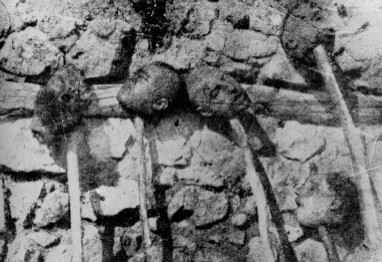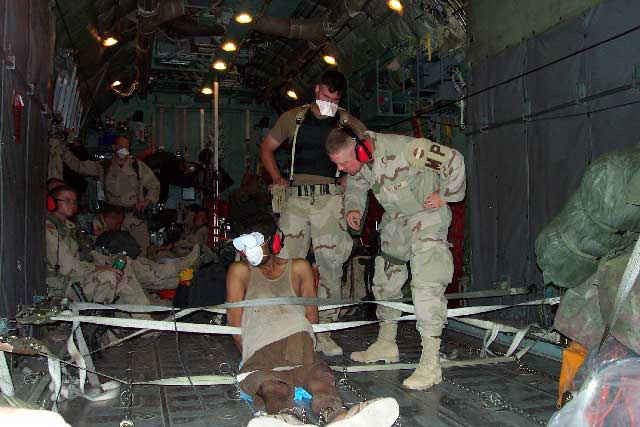|
The Geneva ConventionsWar is an ugly business. For about 10,000 years, that remained the case.Then the Geneva Conventions came along in 1948, and the nations of the world joined hands to transform war from an ugly business into an ugly-business-described-by-solemn-buzzwords-and-unenforceable-guidelines, which allowed countries taking part in war to disavow the ugliness of the business without actually having to conduct the business in any meaningfully different manner. This is what we call "civilization."
After World War II, which was (at the time) arguably the worst war ever, the nations of the world started to wonder about this whole war business. Although war had been an inescapable fact of life ever since primates figured out how to sharpen sticks, the primates of the 1940s were more than a little unsettled by WWII's unprecedented body count, unspeakable atrocities, genocidal mass murder and wholesale slaughter of civilians (to the tune of more than 200,000 in a single day's work). The Geneva Conventions were actually an update of previously drafted set of standards also known as the Geneva Conventions, but no one paid any attention to the first Geneva Conventions, so they don't count. You might be tempted to say the same thing about the current Geneva Conventions after reading this, but historians generally regard it as classier to wait 30 or 40 years before stating the obvious. The nations of the world had two bright ideas for dealing with this problem of war. The first was the United Nations. This was a great idea. Really. You can't fault them for trying (well, you could if you wanted). One of the first things the U.N. did was sit down in Geneva, Switzerland, and try to find a kinder, gentler way to wage war. What better place than Switzerland? (To quote Harry Lime (played by Orson Welles) in The Third Man: "In Italy for 30 years under the Borgias they had warfare, terror, murder, and bloodshed, but they produced Michelangelo, Leonardo da Vinci, and the Renaissance. In Switzerland they had brotherly love—they had 500 years of democracy and peace, and what did that produce? The cuckoo clock!") In December 1948, the U.N. Convention on the Prevention and Punishment of the Crime of Genocide passed the first article of what would be known as the Geneva Conventions. Genocide was defined as murder "committed with the intent to destroy, in whole or in part, a national, ethnical, racial or religious group." Taking a page from the Nuremberg Trials, the convention drew up a list of punishable crimes "genocide; conspiracy to commit genocide; direct and public incitement to commit genocide; attempt to commit genocide; [and] complicity in genocide." The initial statement on genocide was followed up by subsequent conventions dealing with various related and unrelated aspects of war, including prisoners of war and the treatment of civilians. Three more articles were adopted in 1949, and the Conventions were updated and expanded in 1977. The RulesIn very broad strokes, here are the major points mandated in the tens of thousands of words and hundreds of rules known as the Geneva Conventions, as identified by the International Red Cross:

Breaking the RulesNeedless to say, once the civilized world agreed on the basic principles of decency and honor, those principles were promptly discarded in favor of expediency and sadism.Given the fact these rules were largely instituted as a response to Nazi atrocities during WWII, it's ironic that Israel is considered one of the worst offenders, racking up dozens of clear Geneva Conventions violations and hundreds more rumored or suspected violations, mostly concerning the Palestinians. A 2002 U.N. resolution condemning Israel's treatment of the Palestinians laid out a number of violations, including "the siege of Yasser Arafat's Headquarters in Ramallah, by the Occupying Power in violation of the Geneva Conventions. Those include annexation and settlement, the reoccupation of Palestinian cities and blocking of roads between them; expulsions and targeted assassination of scores of Palestinians; attacks on ambulances and medical personnel; house demolitions; destruction of water storage facilities; uprooting of thousands of fruit and olive trees; 24-hour curfews; almost permanent closures of towns, villages and cities; and excessive use of force, including weapons of war such as F-16 bombers and helicopter gunships used against apartment houses, refugee camps and other civilian targets, causing the deaths of numerous Palestinians." In addition, Israel's intelligence service, the Mossad, is one of the most notorious and practiced practitioners of interrogative torture in the world. The use of War Crimes tribunals in relation to the Geneva Conventions has mostly been reserved for a) Third World countries with little power to defend themselves and b) regimes which have collapsed so thoroughly that no one cares what happens to their former leaders. This includes countries like Rwanda and the former Yugoslavia, the great "successes" in international war crime prosecution.
Other countries pretty much do what they want, and no one tries to stop them. Among these nations, the United States stands out as the "Untouchable." U.S. forces and policy-makers have been involved in a number of high-profile incidents over the years, which is one reason the U.S. has opted out of the International Criminal Court initiative. The best known violations came during the Vietnam War, such as the high-profile My Lai Massacre, and countless proven and alleged incidents involving the destruction of civilian villages, mass defoliation with Agent Orange, the execution of prisoners (civilian and military) and the use of napalm and poison gas. Former U.S. Senator Bob Kerrey served on a U.S. death squad operating under orders to kill Vietnamese civilians in the Mekong Delta village of Thanh Phong. He said he was sorry (and he's not from Rwanda), so apparently he doesn't get a war crimes tribunal. And public outcry regularly wells up in calls for a Henry Kissinger tribunal every eight months or so. After September 11, the U.S. stopped even giving lip service to the rules of war, by declaring al Qaeda operatives and allies "unlawful combatants," which American policy makers took to mean "non-entities." As part of its terrorism-inspired attack on Afghanistan's ruling Taliban, the U.S. joined forces with the Northern Alliance, a faction known for its roving rape gangs and frequent execution of prisoners. Hundreds of prisoners from that invasion were unceremoniously shipped to detention camps in Afghanistan and Cuba where some were imprisoned in the rough equivalent of barbed-wire straightjackets—cells in which they were restrained in a standing position with no range of movement. Several al Qaeda members, from the top echelon leadership to mentally challenged foot-soldiers have been shipped to undisclosed locations where they are carefully tortured with an eye toward legalistic loopholes (i.e., probably no rubber hoses or electrodes taped to genitals). Other highlights of U.S. historical practices include feeding radioactive waste to retarded children during the 1950s and decades of active research into biological and chemical weapons, including anthrax and smallpox. During the 1980s, the fruits of this research were shared with beloved U.S. allies like Iraq. Speaking of Iraq, the 2003 U.S. invasion looks to be a promising source of war crimes to entertain the jaded public for months to come. Although there appeared to be scores of Iraqi civilians killed as "collateral damage" by U.S. attacks within days of the war's start and hundreds (or perhaps thousands) more dying as a result of the coalition's failure to provide legally required support and humanitarian aid to civilians in occupied areas, Saddam Hussein's fighting forces have really been going the extra mile to take the heat off of whatever piddling crimes the Americans manage to muster. It's almost as if Uday Hussein sat down with the Geneva Conventions handbook and drafted a set of orders designed specifically break every single rule listed therein. Within just the first two weeks, the Iraqis televised humiliating pictures of POWs, apparently executed some prisoners, tortured others and possibly dismembered still others. The Iraqi leadership dressed soldiers in civilian clothing and distributed them among the population, posted armed forces in hospital facilities, launched suicide attacks using soldiers dressed as civilians, and used fake surrenders for sneak attacks. About the only atrocity the Iraqis hadn't pulled off by the end of week two was the deployment of the alleged chemical weapons that provided the pretext for launching the war in the first place. Needless to say, it's manifestly unfair to single out the U.S. and Iraq for violations of the Geneva Conventions. Not when you can compile similar lists for China (torture, mass executions, biological and chemical weapons), the former Soviet Union (torture, mass executions, genocide, civilian massacres, assassination, biological and chemical weapons), the current Russia (torture, biological and chemical weapons, trafficking in nuclear weapons), North Korea (torture, executions, nuclear, biological and chemical weapons), Turkey (torture, detention camps, ethnic repression), Pakistan (torture, mass executions, assassination, supporting terrorism, military attacks on civilians, nuclear weapons), Saudi Arabia (torture, supporting terrorism, gender-based oppression), Kuwait (ethnically-based slavery), Chile (torture, mass executions), the Philippines (torture and assassination), Iran (mass executions, religious and ethnic repression, chemical and nuclear weapons), Thailand (torture, child sex trade), Singapore (torture), Malaysia (torture, execution, illegal detentions), Sudan (torture, supporting terrorism, mass executions), the Congo (ethnic cleansing, torture, rape gangs, civilian massacres), South Africa (apartheid, torture, assassinations, civilian massacres), Kenya (gender-based persecution, torture, massacres), Uganda (slavery, child abduction, massacres, rape, child sex trade), Cuba (mass detention, assassinations), Colombia (assassinations, mass executions, civilian massacres, drug trade)... But this is getting tedious, and unfortunately, it could easily go on for pages and pages. The long and the short of it is this: The Geneva Conventions are great fodder for politicians attacking countries they don't like, but if you feel you have been the victim of a violation, you might as well take it to Judge Judy, because you aren't getting a tribunal unless you happen to live in Rwanda, or possibly (at some point in the distant future) Iraq. Have a nice day.
Protection of Victims of War
|
 As a bonus, the Conventions also allowed combatants to accuse each other of very specific over-the-top ugliness, thus justifying current wars and inflaming still more wars in the future. This is what we call "humanitarianism."
As a bonus, the Conventions also allowed combatants to accuse each other of very specific over-the-top ugliness, thus justifying current wars and inflaming still more wars in the future. This is what we call "humanitarianism."
